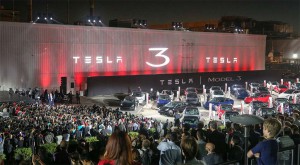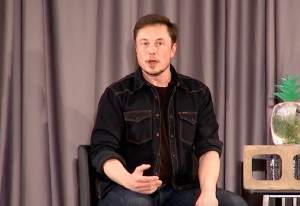Sometimes Tesla founder and CEO Elon Musk means what he tweets — in this case, taking the company private at $420 a share.
Earlier today, Musk hopped on twitter telling his millions of followers, “Am considering taking Tesla private at $420 a share. Funding secured.”
That set off two flurries. One a thread of tweets about everything from what a great idea it is to how followers love marijuana references to how the Securities and Exchange Commission frown on these sorts of pronouncements.
The other flurry was the run up in the company’s share price that crossed the $375 a share threshold and began approaching its former record high near $400 a share. Trading on the stock was halted before it got there, but no explanation was offered.
(Tesla’s looking to hire video game designers. Click Here for the story.)
However, Musk may have taken care of that himself when he emailed the company’s employees telling them he was very serious about taking the company private. In the missive, he outlined why he thought it would work, the benefits to the company and employees as well as when the company might return to the public market.

Tesla employees, like those shown at the Model 3 handoff, would have to approve the move to take the company private.
He assured employees that no decision has been made, but the volatility of the stock market and the motivations of Tesla shareholders can create difficult situations for the company, encouraging wild swings in the price of the stock.
“Being public also subjects us to the quarterly earnings cycle that puts enormous pressure on Tesla to make decisions that may be right for a given quarter, but not necessarily right for the long-term,” he wrote. “Finally, as the most shorted stock in the history of the stock market, being public means that there are large numbers of people who have the incentive to attack the company.”
Musk pointed to another company he runs, SpaceX, as the model for Tesla to follow, although he was careful to make sure readers knew that there aren’t plans to merge the two companies — they will remain separate.
Once Tesla entered a period of slower sustained growth, then the company could return to the public market, largely immune to the volatile forces at play on the EV maker these days.
“I fundamentally believe that we are at our best when everyone is focused on executing, when we can remain focused on our long-term mission, and when there are not perverse incentives for people to try to harm what we’re all trying to achieve,” he wrote.
(Click Here for details about Musk’s plans to take the company private.)
The plan to take it private is pretty straightforward, current shareholders would have a choice: they can stay in or cash out at $420 a share, which Musk says is a 20% premium over the share price on the day it announced its second-quarter earnings. “My hope is for all shareholders to remain, but if they prefer to be bought out, then this would enable that to happen at a nice premium,” he wrote.
Employees would still be able to periodically sell their shares and exercise their options. Every six months there would be an opportunity to buy or sell shares, he noted. He was also quick to dispel rumors about Musk looking to gain greater control of the company.
“I own about 20% of the company now, and I don’t envision that being substantially different after any deal is completed,” he said. “Basically, I’m trying to accomplish an outcome where Tesla can operate at its best, free from as much distraction and short-term thinking as possible, and where there is as little change for all of our investors, including all of our employees, as possible.”
There are a few hurdles to clear to get the deal done. First, the deal has to be approved by the shareholders, which he believes will happen. Second the funding actually has to be in place.
“I don’t know where he’d get the financing,” said Joe Phillippi, a long-time Wall Street analyst who now runs AutoTrends Consulting, noting that at the current stock price the company has a market valuation of more than $62 billion, or nearly 20% more than General Motors. At $420 a share it would jump to nearly $70 billion.
(Tesla Q2 losses double, but profits promised in Q3. Click Here for the story.)
Musk didn’t set a timetable for making a final decision about taking the company private, although sooner rather than later would likely be the plan. Also it’s unclear at this point what regulatory issues, if any, will need to be resolved and how long that would take.

